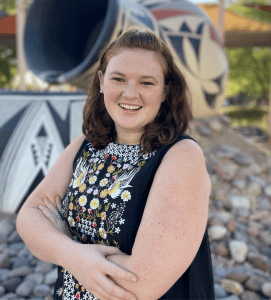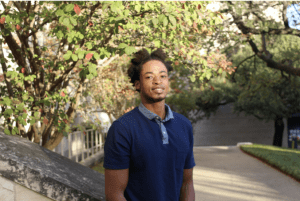Chano Arreguin-Abarca is President of the Minorities in Social Sciences. As a third year PhD student, Chano is broadly interested in bridging the social and natural sciences. That is, grounding our understanding of political phenomena on evolutionary foundations and considering gene-culture coevolutionary processes. For example, he seeks to examine how the construction and thus, the variation of institutions are a product of fundamental preferences for how to organize society. A specific area of interest is illustrating how preferences for different rules regarding resource acquisition influence our political preferences (i.e., parties, candidates, policies).
Liana Eustacia Reyes is the interim Vice-President, Founder and former President of the Minorities in Social Sciences. Liana is a PhD candidate at Rice University’s Department of Political Science and predoctoral social scientist at University of Arizona’s School of Government and Public Policy. Her research addresses the interaction between law and conflict. To this end, Liana’s dissertation examines how disagreements over appropriate legal systems contribute to the resolution and recurrence of civil conflict. This research is being generously supported by the National Science Foundation and Rice University’s Social Sciences Research Institute.

Marques Zárate is Treasurer and former President of the Minorities in Social Sciences. Marques is a PhD candidate in Political Science specializing in Race and Ethnic Politics, Political Psychology, and Political Behavior. His dissertation evaluates how qualities of the candidate and the candidate’s appeal affect how citizens determine whether the candidate is being sincere or pandering. External to his dissertation, Marques investigates how external cues, such as threat or political communication, affect the way that people engage with their political environment. He is particularly interested in how Hispanic and White voters evaluate politicians that use Spanish language appeals and whether political trust acts as a moderator for anxiety and political participation.
Felix Wu is the Psychological Sciences Department Representative of the Minorities in Social Sciences. Felix is a 3rd year PhD student in the Industrial-Organizational Research Interest Group. He is broadly interested in research regarding workplace disparities for people with disabilities, new personnel selection systems such as game-based assessments with Big Data, and the influence that motivation and personality have on psychological phenomenon. As an NSF Graduate Research Fellow, Felix’s research is generously funded by the National Science Foundation.

Allegra Hernandez is the Political Science Department Representative of the Minorities in Social Sciences. Allegra is a third-year PhD student in the Department of Political Science. Her research agenda aims to understand how cultural legacies shape current political beliefs and behavior. In a different vein, Allegra is working on a collaborative NSF funded study that examines how individual trust in differing types of institutions impacts compliance with measures to stop the spread of Covid-19. This is part of a long-term panel study. The team finds that the institutions individuals trust significantly affects respondents’ willingness to comply with safety measures. Allegra’s research agenda stems from her lived experiences growing up in the only public-school district in the country that busses students from Mexico to the United States every day. The dichotomy between New Mexico’s welcoming policies towards Mexico and its citizens versus Arizona’s passage of SB-1070 in 2010, which imposed some of the strictest immigration controls in the country, developed her need for understanding the ways in which beliefs about neighbors across the border shape individual-level behaviors and state-wide policies. In 2017, Allegra graduated with honors from Texas Christian University with a BS in Political Science and a BA in Art History. During her undergraduate tenure, she worked with the Department of State in Albania and Zambia where she organized joint military training exercises focused on counterterrorism and on creating policies aimed to alleviate ethnic divides following electoral loss, respectively.

Rigoberto Quintana is the Department of Anthropology’s Representative of the Minorities in Social Science. He is a second-year PhD student studying social-cultural anthropology. His research broadly focuses on migration and analyzes the intersections of legal status, work visas, urban development, and the political economy at international ports. He is currently working on an NSF funded project that creates a digital platform using ArcGIS to display the environmental consequences of cryospheric loss in Greenland and Iceland, and sea level rise in Cape Town and Honolulu due to Climate Disruption.
Michael Carroll is the Department of Sociology’s Representative of the Minorities in Social Sciences. He is a 2nd year PhD.  His research interests are broadly in the areas of racism, class, inequality, racial identity, and how place intersects with and complicates those concepts. Overall, his research agenda aims to illuminate the neglected experiences of African Americans within various social issues, which allows us to better locate the mechanisms and social forces that produce inequalities.
His research interests are broadly in the areas of racism, class, inequality, racial identity, and how place intersects with and complicates those concepts. Overall, his research agenda aims to illuminate the neglected experiences of African Americans within various social issues, which allows us to better locate the mechanisms and social forces that produce inequalities.


